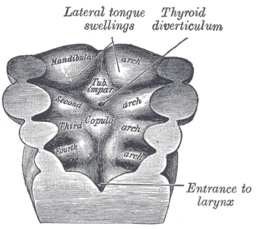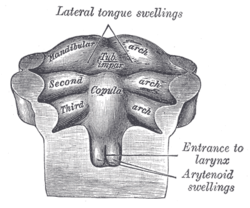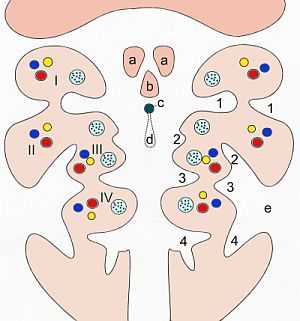Tuberculum impar
| Unpaired swelling | |
|---|---|
 Floor of pharynx of human embryo about twenty-six days old. | |
 Floor of pharynx of human embryo of about the end of the fourth week. | |
| Details | |
| Latin | tuberculum linguale mediale, tuberculum impar, tuber impar |
| Gives rise to | tongue |
| Identifiers | |
| Gray's | p.1102 |
| Dorlands /Elsevier | t_21/12828887 |
| Anatomical terminology | |

a Tuberculum laterale
b Tuberculum impar
c Foramen cecum
d Ductus thyreoglossus
e Sinus cervicalis
During the third week of embryogenesis there appears, immediately behind the ventral ends of the two halves of the mandibular arch, a rounded swelling named the tuberculum impar, which was described by His as undergoing enlargement to form the buccal part of the tongue.
More recent researches, however, show that this part of the tongue is mainly, if not entirely, developed from a pair of lateral swellings which rise from the inner surface of the mandibular arch and meet in the middle line. The site of their meeting remains post-embryonically as the median sulcus of the tongue.
The tuberculum impar is said to form the central part of the tongue immediately in front of the foramen cecum, but Hammar insists that it is purely a transitory structure and forms no part of the adult tongue.
References
This article incorporates text in the public domain from the 20th edition of Gray's Anatomy (1918)
External links
- ‹The template EMedicineDictionary is being considered for deletion.› median+lingual+swelling at eMedicine Dictionary
- hednk-024 — Embryo Images at University of North Carolina
| ||||||||||||||||||||||||||||||||||||||
yes hammar estimation is right tuberculum impar disappears in adult tongue.